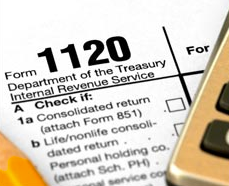By David Swedelson, Partner at SwedelsonGottlieb, Community Association Attorneys
 I am not an accountant, far from it. But I am aware that there are two different tax returns that condos, HOAs, and cooperatives can (and should) file (and yes, community associations, while exempt to some extent from paying taxes on assessment income, still may have income and need to file tax returns). I have never really understood when an association would file one tax return form versus the other. I was therefore interested in a blog article on this issue by Donna DiMaggio Berger, a Florida community association attorney. Donna’s article addressed a class she took that focused on the issues pertaining to association tax returns. I am only going to summarize it here. [Editor’s note: the prior link to Donna’s article is no longer valid, our apologies.]
I am not an accountant, far from it. But I am aware that there are two different tax returns that condos, HOAs, and cooperatives can (and should) file (and yes, community associations, while exempt to some extent from paying taxes on assessment income, still may have income and need to file tax returns). I have never really understood when an association would file one tax return form versus the other. I was therefore interested in a blog article on this issue by Donna DiMaggio Berger, a Florida community association attorney. Donna’s article addressed a class she took that focused on the issues pertaining to association tax returns. I am only going to summarize it here. [Editor’s note: the prior link to Donna’s article is no longer valid, our apologies.]
As Donna points out, most board members are not all likely to understand the complexities of accounting principles. And most likely do not understand the complexities of tax issues, returns, etc. as the same applies to their homeowners association. This means that board members do need to hire a competent accounting professional to assist their community.
Donna noted that she is not a CPA, and she referenced the following from the class she took (I have revised same to reference how we address these things in California):
Community associations are nonprofit mutual benefit corporations, and as such, they are NOT a nonprofit corporation which is tax-exempt such as a 501(c)(3), which is typically a religious or charitable institution. And Donna reiterates what I pointed out above, that “some directors still erroneously believe that [their] association does not need to file a tax return as a result of its not-for-profit status.”
90% of community associations file the one-page federal 1120-H return, which is the easiest form to prepare for condominiums and HOAs. The 1120 return is a more complicated form and is, at a minimum, a five-page return which carries greater risk.
Many board members do not understand what income is taxable. Actually, all income the association receives may be taxable if the association does not make an election on what to do with excess income over expenses. But for the most part, all assessment monies, the fees paid by the owners, are tax exempt.
Donna suggests, as an example of membership income that would be taxable, that application fees and security deposits are not tax exempt. I would agree if the security deposit is non-refundable. Fees for the use of the clubhouse or rec room are not tax exempt. Neither is interest on bank accounts (not a big issue now, but it was an issue when interest paid on those accounts was higher). Donna states, and I agree, that “it is important from an accounting standpoint to segregate the membership vs. non-membership income.”
According to Donna, “the tax treatment of reserve funds has some interesting nuances. Capital reserves are not taxable. A classic example of a capital reserve would be a roof reserve, as it adheres to the structure. Non-capital reserves, on the other hand, are taxable. A painting reserve and a hurricane deductible reserve are two examples of non-capital reserves. If you pool capital reserves (i.e. roof reserve) with non-capital reserves (i.e. painting reserve) then all of the reserves will be treated as non-capital reserves. Pooling reserves are a big no-no for commercial condominiums as far as taxes are concerned.” I have not heard this before, and if you are a CPA or have expertise in this area, I would like to hear what you have to say about taxation of capital versus non-capital reserves. The fact is that in California, I do not believe that community associations do not make this kind of distinction in how an association allocates reserves.
According to Donna, the following associations cannot file the 1120H return:
• Commercial Condominiums • Condominium Hotels • Cooperative associations (they must file an 1120-C form).
There are certain thresholds which must be met in order for an association to avail itself of the 1120-H tax return. Those thresholds are:
• 85% of the units must be residential in nature.
• 60% of the association’s income must be derived from assessments.
• 90% of the association’s expenses have to go towards the “acquisition, construction, management, maintenance or care of association property.”
Donna points out that there are penalties that may be imposed on an association that fails to file the proper tax return. So it is important for community associations to retain a qualified CPA that has worked with and understands the Internal Revenue Code in this area.
Got questions? Please contact your association’s accountant, as I cannot answer them.
David Swedelson is a condo lawyer and HOA attorney. He has no expertise or training in community association accounting or tax issues. David is an expert in California community association law. He can be reached via email at: dcs@sghoalaw.com
 HOA Law Blog
HOA Law Blog


